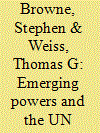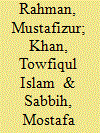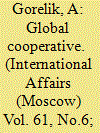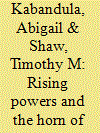|
|
|
Sort Order |
|
|
|
Items / Page
|
|
|
|
|
|
|
| Srl | Item |
| 1 |
ID:
136058


|
|
|
|
|
| Summary/Abstract |
The importance of emerging powers in the UN development system is undeniable, but their influence over the shape of the post-2015 agenda is less clear. This article examines recent survey data by the Future UN Development System (funds) Project in order to better gauge the perceptions of the problems and prospects.
|
|
|
|
|
|
|
|
|
|
|
|
|
|
|
|
| 2 |
ID:
178435


|
|
|
|
|
| Summary/Abstract |
The number of people aged more than 60 in Bangladesh is projected to constitute 20% of total population by 2051. The demographic momentum makes it necessary to pursue policies that guarantee a secured life for the country’s senior citizens. Currently, more than 40% of old age population (more than 65 years) in Bangladesh do not receive any type of pension or social security benefits. In this backdrop, introduction of a universal pension scheme (UPS) is an idea that should merit serious consideration. The idea of a UPS is also aligned with several Sustainable Development Goals (SDG) targets. Based on the International Labour Organization multi-pillar pension model, the article deals with required financing under different scenarios of introducing UPS in Bangladesh. The study estimates that for introducing a non-contributory UPS in Bangladesh, it would require an additional average allocation equivalent to 0.1%–0.5% of gross domestic product per annum between now and 2040. The article also estimates financing needs considering two options for the contributory UPS. The article concludes that UPS in Bangladesh can be launched on a limited scale which then could be expanded in scope and coverage in a gradual and phased manner. The article also underscores that introduction of UPS will create opportunities to rationalize the existing safety net programmes that will release funds for underwriting the UPS.
|
|
|
|
|
|
|
|
|
|
|
|
|
|
|
|
| 3 |
ID:
177527


|
|
|
|
|
| Summary/Abstract |
ON OCTOBER 10, 2020, the Food and Agriculture Organization of the United Nations (FAO) marked its 75th anniversary. This specialized structure of the UN with a global mandate in food, agriculture, fisheries and development of rural areas predated the "big UN" (which celebrated its jubilee on October 24) by a week.
|
|
|
|
|
|
|
|
|
|
|
|
|
|
|
|
| 4 |
ID:
144959


|
|
|
|
|
| Summary/Abstract |
Its numerous trump cards, on the other hand, allow this global organization to claim the role of an instrument to be used to improve life on Earth. This claim stems from its legitimacy and moral authority that rests on its unique Charter (the backbone of international law), a vast intellectual luggage, a wide sphere of interests and competences, and its ability to attack the hardest problems and talk as an equal to world powers.
|
|
|
|
|
|
|
|
|
|
|
|
|
|
|
|
| 5 |
ID:
151003


|
|
|
|
|
| Summary/Abstract |
Global climate policy till date has focused on building consensus around a differentiated roadmap for reducing greenhouse gas emissions. Equally important yet receiving less attention is the need to support adaptation of the most vulnerable communities to the increasingly severe impacts of climatic changes. The Paris Agreement, negotiated at the 21st COP in December 2015, ‘stitches up’ national contributions on adaptation and mitigation into a global agreement. This article first reviews the adaptation components of the Intended Nationally Determined Contributions (INDCs) submitted by developed, emerging and least developed nations. Second, we examine how adaptation and the related themes of loss and damage have been dealt with in the Paris Agreement in terms of: global goal, legal form, review mechanisms and financing arrangements. Finally, we look at the possibility of evolving new arrangements and opportunities for strengthening global response to adaptation by drawing on references to human rights and climate justice in the Paris Agreement. We contend that the global response cannot be relegated to action by individual nations—partly and loosely supported by global financial and technological flows. The Paris Agreement has made significant steps in raising the importance of adaptation vis-à-vis mitigation in climate action but a lot of work remains to be done. In a sense, the top-down elements of adaptation action reflect long held negotiating positions and the skepticism of developed nations with respect to adaptation. For the post-Paris climate regime to be legitimate and earn the trust of developing nations, it must focus equally on adaptation and mitigation and address the special needs of vulnerable communities across the world.
|
|
|
|
|
|
|
|
|
|
|
|
|
|
|
|
| 6 |
ID:
163371


|
|
|
|
|
| Summary/Abstract |
Rising powers are evolving centres for varieties of conflict as well as development. With a focus on the complexities of the Horn of Africa, we juxtapose Jan Nederveen Pieterse1 on what is rising – States? Inter-regionalisms? Diasporas? Economies? Companies? New technologies? – with the late Jim Hentz2 on non-traditional security (NTS) challenges on the continent. NTS factors include fragile states/ungoverned spaces, migrations and viruses, which continue to undermine contemporary state and governance structures inside and around Africa. In turn, NTS challenges demand alternative and creative ways to address them. We show how the Horn of Africa illustrates all these and other emergent factors in differing proportions over time, including the diversity of diasporas, both intra- and extra-regional. Further, we argue that rising powers internal and regional transnational tensions could impact human security for the foreseeable future. Thus, affecting the prospects for meeting Sustainable Development Goals (SDGs) in the Global South.
|
|
|
|
|
|
|
|
|
|
|
|
|
|
|
|
|
|
|
|
|